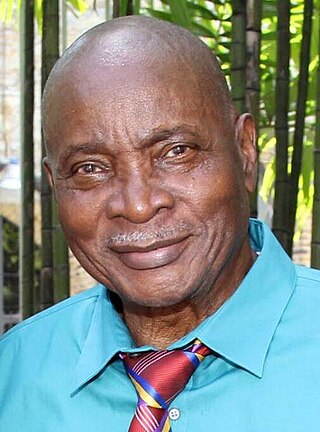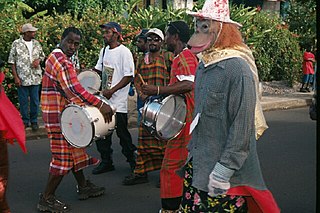Related Research Articles
Soca music is a genre of music defined by Ras Shorty I, its inventor, as the "Soul of Calypso", which has influences of African and East Indian rhythms. It was originally spelled "sokah" by its inventor but through an error in a local newspaper when reporting on the new music it was erroneously spelled "soca"; Lord Shorty confirmed the error but chose to leave it that way to avoid confusion. It is a genre of music that originated in Trinidad and Tobago in the early 1970s and developed into a range of styles during the 1980s and after. Soca was initially developed by Lord Shorty in an effort to revive traditional calypso, the popularity of which had been flagging amongst younger generations in Trinidad due to the rise in popularity of reggae from Jamaica and soul and funk from the United States. Soca is an offshoot of calypso/kaiso, with influences from East Indian rhythms and hooks.
Calypso is a style of Caribbean music that originated in Trinidad and Tobago during the early to mid-19th century and spread to the rest of the Caribbean Antilles by the mid-20th century. Its rhythms can be traced back to West African Kaiso and the arrival of French planters and their slaves from the French Antilles in the 18th century.

Slinger Francisco ORTT CM OBE, better known as Mighty Sparrow, is a Trinidadian calypso vocalist, songwriter, and guitarist. Known as the "Calypso King of the World", he is one of the best-known and most successful calypsonians. He has won Trinidad's Carnival Road March competition eight times, Calypso King/Monarch eight times, and has twice won the Calypso King of Kings title.
The music of Trinidad and Tobago is best known for its calypso music, soca music, chutney music, and steelpan. Calypso's internationally noted performances in the 1950s from native artists such as Lord Melody, Lord Kitchener and Mighty Sparrow. The art form was most popularised at that time by Harry Belafonte. Along with folk songs and African- and Indian-based classical forms, cross-cultural interactions have produced other indigenous forms of music including soca, rapso, parang, chutney, and other derivative and fusion styles. There are also local communities which practice and experiment with international classical and pop music, often fusing them with local steelpan instruments.
The music of Martinique has a heritage which is intertwined with that of its sister island, Guadeloupe. Despite their small size, the islands have created a large popular music industry, which gained in international renown after the success of zouk music in the later 20th century. Zouk's popularity was particularly intense in France, where the genre became an important symbol of identity for Martinique and Guadeloupe. Zouk's origins are in the folk music of Martinique and Guadeloupe, especially Martinican chouval bwa, and Guadeloupan gwo ka. There's also notable influence of the pan-Caribbean calypso tradition and Haitian kompa.
The music of Guadeloupe encompasses a large popular music industry, which gained in international renown after the success of zouk music in the later 20th century. Zouk's popularity was particularly intense in France, where the genre became an important symbol of identity for Guadeloupe and Martinique. Zouk's origins are in the folk music of Guadeloupe and Martinique, especially Guadeloupan gwo ka and Martinican chouval bwa, and the pan-Caribbean calypso tradition.

The music of Dominica includes a variety of genres including all the popular genres of the world. Popular music is widespread, with a number of native Dominican performers gaining national fame in imported genres such as calypso, reggae, soca, kompa, zouk and rock and roll. Dominica's own popular music industry has created a form called bouyon, which combines elements from several styles and has achieved a wide fanbase in Dominica. Groups include WCK, Native musicians in various forms, such as reggae, kadans (Ophelia Marie, and calypso, have also become stars at home and abroad.
The music of the Lesser Antilles encompasses the music of this chain of small islands making up the eastern and southern portion of the West Indies. Lesser Antillean music is part of the broader category of Caribbean music; much of the folk and popular music is also a part of the Afro-American musical complex, being a mixture of African, European and indigenous American elements. The Lesser Antilles' musical cultures are largely based on the music of African slaves brought by European traders and colonizers. The African musical elements are a hybrid of instruments and styles from numerous West African tribes, while the European slaveholders added their own musics into the mix, as did immigrants from India. In many ways, the Lesser Antilles can be musically divided based on which nation colonized them.
Edwin Ayoung, better known as Crazy, is a Trinidadian calypsonian. He has been active since the mid-1970s and is one of the most successful artists from Trinidad and Tobago.
Cadence-lypso is a fusion of cadence rampa from Haiti and calypso from Trinidad and Tobago that has also spread to other English speaking countries of the Caribbean. Originated in the 1970s by the Dominican band Exile One, it spread and became popular in the dance clubs around the Creole world and Africa as well as the French Antilles.

Destra Garcia is a Trinidadian musician, singer and songwriter of soca music. She is also known by the mononym Destra. She is one of the most popular female soca artists in the world.

Denyse Burnadette Kirline Plummer was a Trinidadian calypsonian and gospel singer. The child of a white father and a black mother, she initially faced significant prejudice in a genre traditionally seen as Afro-Caribbean, but was eventually recognised as a leading calypso performer. In 2001, she won the Calypso Monarch title with her songs "Heroes" and "Nah Leaving".

As an overseas department of France, Martinique's culture is French, African and Caribbean. Its former capital, Saint-Pierre, was often referred to as the Paris of the Lesser Antilles. The official language is French, although many Martinicans speak a Creole patois. Based in French, Martinique's Creole also incorporates elements of English, Spanish, Portuguese, and African languages. Originally passed down through oral storytelling traditions, it continues to be used more often in speech than in writing.

Winston McGarland Bailey OBE, HBM, DLitt, better known by his stage name The Mighty Shadow or Shadow, was a calypsonian from Tobago.

Any Minute Now is an album by Trinidadian Soca artist Machel Montano and his band Xtatik released in 1999.
St. Dominic's Children's Home, formerly Belmont Orphanage, is located in Port of Spain, Trinidad and Tobago. It was established by French Priest Mariano Forestier in 1871 and expanded with additional buildings in subsequent years. The Handbook of Jamaica dates the orphanage to 1892. It was home to boxer Daniel James. It was also home to the calypsonian Daniel Brown and Roy Cape.
Roy Francis Cape was a Trinidadian calypso saxophonist who was active as a band musician for more than 50 years. He was featured on hundreds of recordings and has released eight albums with the Roy Cape All Stars.
The Trinbago Unified Calypsonians’ Organisation (TUCO) is a professional body representing the interests of calypsonians in Trinidad and Tobago and working to promote calypso music nationally and internationally. TUCO was established in 1993 and incorporated by an Act of Parliament in 1998. TUCO serves as the governing body for calypso in Trinidad and Tobago.

Franklyn McIntosh is a St Vincent-born pianist and arranger of calypso and soca music. He is recognized as one of the pioneer music arrangers who helped usher in the soca style of West Indian popular music in the 1970s and 1980s.
References
- ↑ Guilbault, Jocelyne. "Jocelyne Guilbault". UC Berkeley Department of Music. UC Berkeley. Retrieved September 30, 2024.
- ↑ Guilbault, Jocelyne (Autumn 1988). "Review of The Man-of-Words in the West Indies: Performance and the Emergence of Creole Culture by Roger D. Abrahams". Ethnomusicology. 32 (3): 455–458. doi:10.2307/851947. JSTOR 851947 . Retrieved September 30, 2024.
- ↑ Sommer, Julia (February 10, 1999). "New Faculty Profile: Jocelyn Guilbault, Ethnomusicologist". UC Berkeley. Berkeleyan. Retrieved September 30, 2024.
- ↑ "Department of Music Celebrates Jocelyne Guilbault in Retirement". Berkeley Music. UC Berkeley. Retrieved September 30, 2024.
- ↑ Guilbault, Jocelyne (December 23, 2019). "Keynote: Party Music, Affect and the Politics of Modernity". Journal of World Popular Music. 6 (2): 173–192. doi:10.1558/jwpm.40172 . Retrieved September 27, 2024.
- ↑ Meredith, Sharon (November 3, 2009). "Review of Governing Sound: The Cultural Politics of Trinidad's Carnival Musics". Ethnomusicology Forum. 18 (2): 283–285. doi:10.1080/17411910903141999 . Retrieved September 29, 2024.
- ↑ Hill, Donald R. (2009). "Reviewed Work: Governing Sound: The Cultural Politics of Trinidads Carnival Musics by Jocelyne Guilbault". NWIG: New West Indian Guide / Nieuwe West-Indische Gids. 83 (3/4): 353–355. JSTOR 41850546 . Retrieved September 30, 2024.
- ↑ Guilbault, Jocelyne (September 2007). Governing Sound: The Cultural Politics of Trinidad's Carnival Musics. Chicago: University of Chicago Press. ISBN 9780226310602.
- ↑ Guilbault, Jocelyne; Cape, Roy (2014). Roy Cape: A Life on the Calypso and Soca Bandstand. Durham, NC: Duke University Press. doi:10.1215/9780822376163. ISBN 978-0-8223-7616-3.
- ↑ Guilbault, Jocelyne (1993). Zouk: World Music in the West Indies. Chicago: University of Chicago Press. ISBN 9780226310428.
- ↑ Guilbault, Jocelyne; Rommen, Timothy (2019). Sounds of Vacation: Political Economies of Caribbean Tourism. Durham, NC: Duke University Press. doi:10.1215/9781478005315. ISBN 978-1-4780-0531-5.